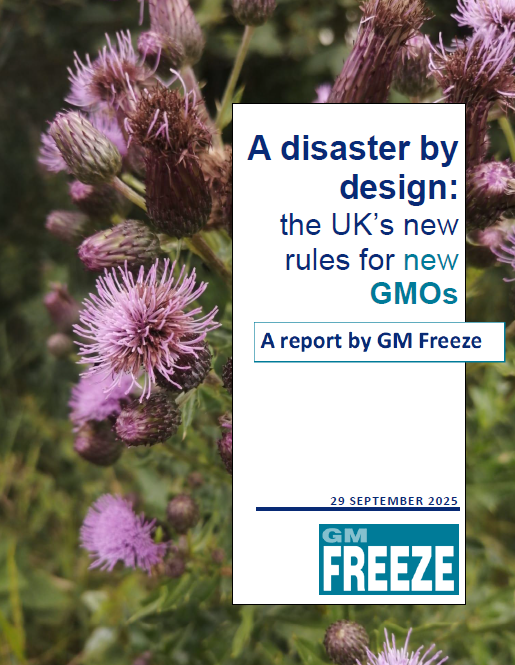Open letter to new DEFRA officials: Building safeguards into the management of new GMOs
Dear Emma Reynolds MP, Dame Angela Eagle DBE MP and Professor Anjali Goswami,
Cc: The Genetic Technologies and Precision Breeding teams at DEFRA and the FSA respectively.
I am writing to you from GM Freeze, a membership organisation that campaigns for the adequate regulation of Genetically Modified Organisms (GMOs). Congratulations on your recent appointments.
As you will know, in May Daniel Zeichner MP signed into law the Genetic Technology (Precision Breeding) Regulations, which finalised the legislative framework for new forms of GMOs. However, the guidance produced by both DEFRA and the Food Standards Agency on the production and authorisation of Precision Bred Genetically Modified Organisms (PB-GMOs) is still in draft form.
| Today we have published the report ‘Disaster by design: the UK’s new rules for new GMOs’. In it we outline the many problems with the new framework, and highlight the ways in which it fails to ensure that environmental, health and socio-economic risks will be adequately managed.
We urge you to consider whether there are any ways in which you could make the Genetic Technology (Precision Breeding) legislation and guidance more robust. |
 |
In particular we request your consideration of the following:
- The potential for the identification of PB-GMOs in farms and food supply chains, notably the use of farm-level notification requirements and unique reference numbers throughout supply chains.
- Recent developments in the European DARWIN project on detection methods.
- The possibility of introducing environmental risk assessments.
- The potential for the introduction of co-existence measures to minimise the contamination risks for non-GMO producers and traders.
- Commissioning a study on the likely impacts of patents, and how the related risks could be minimised for conventional breeders and all farmers.
- Commissioning a study on the likely impacts on global food security and Food Sovereignty.
- Introducing sustainability requirements for new PB-GMO varieties.
Further information on each of these issues, and more, is available in the attached report.
Whilst we note that the primary and secondary legislation has now been signed into law, we draw your attention to clause 42 of the Genetic Technology (Precision Breeding) Act on the ‘Power to make consequential provision’.
We urge you to consider your responsibilities under the 2021 Environment Act, specifically in relation to the Precautionary Principle. There is scientific uncertainty about the risks posed, as evidenced by reports from the French National Agency for Food, Environmental and Occupational Health Safety (ANSES)[1], the German Federal Agency for Nature Conservation (BfN)[2] and the Environment Agency Austria (UBA)[3].
As indicated above, we also note that there may be scope to amend the draft guidance so that some safeguards can be built into the new system without requiring legislative changes.
Failure to do so will expose the environment, food producers and traders, and the general public, to unacceptable and unnecessary risks. Please consider the interests of those who you have a responsibility to serve.
Yours in good faith,
Leonie Nimmo
Executive Director
GM Freeze
[1] ‘Risques et enjeux socio-économiques liés aux plantes NTG’, ANSES, January 2024. Available from: https://www.actu-environnement.com/media/pdf/news-43622-avis-anses-nouveaux-ogm.pdf
[2] ‘For a science-based regulation of plants from new genetic techniques: Deregulation of NGT plants contradicts the precautionary principle,’ BfN Policy Brief #2/2024, available from: https://www.bfn.de/sites/default/files/2024-02/24_02_07_BfN_policy_brief_NGT-7_0.pdf
[3] ‘New Genetic Engineering – possible unintended effects,’ available from: https://emedien.arbeiterkammer.at/viewer/image/AC16982244/6/LOG_0007/



